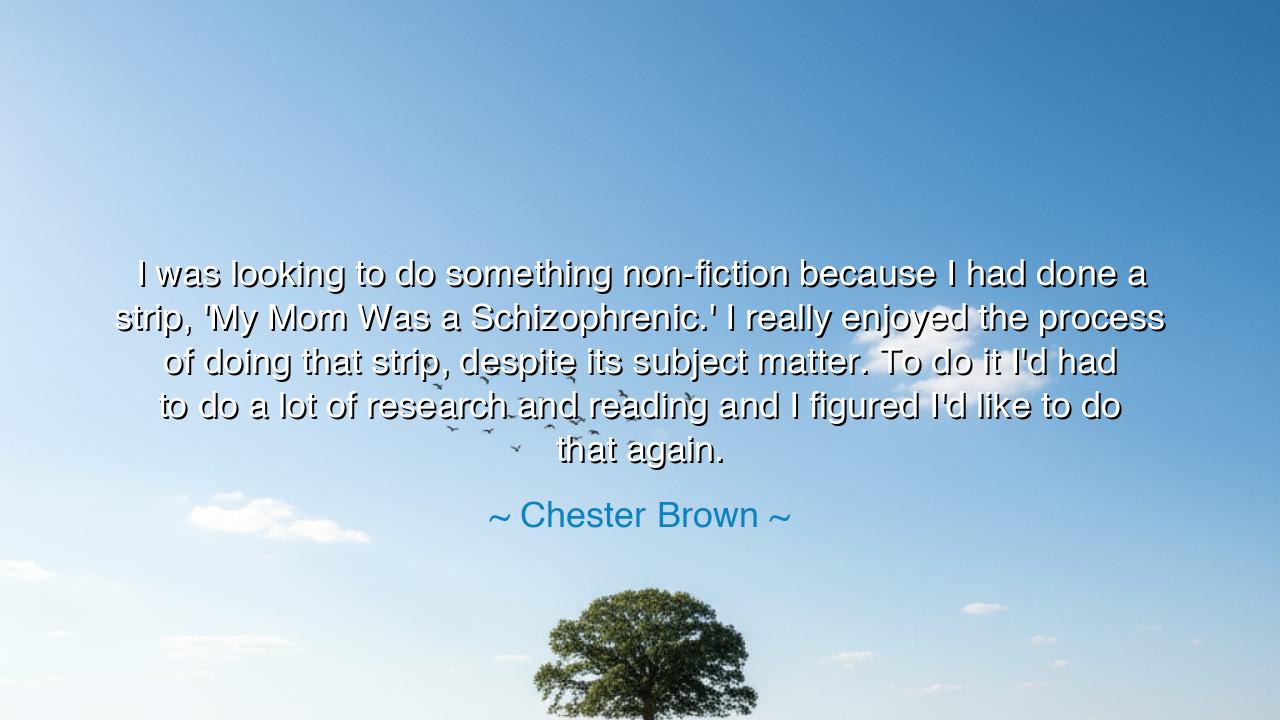
I was looking to do something non-fiction because I had done a
I was looking to do something non-fiction because I had done a strip, 'My Mom Was a Schizophrenic.' I really enjoyed the process of doing that strip, despite its subject matter. To do it I'd had to do a lot of research and reading and I figured I'd like to do that again.






When Chester Brown said, “I was looking to do something non-fiction because I had done a strip, ‘My Mom Was a Schizophrenic.’ I really enjoyed the process of doing that strip, despite its subject matter. To do it I'd had to do a lot of research and reading and I figured I'd like to do that again,” he was not merely speaking of art or research—he was speaking of the deep human desire to seek truth through creation. His words carry the spirit of a craftsman who walks willingly into difficult terrain, not for fame or beauty, but for understanding. The joy he describes, paradoxically found within the shadow of sorrow, is the joy of the seeker—the one who dares to look into pain and find wisdom there.
To create from truth, especially from a truth that wounds, is one of the oldest and noblest labors of the soul. Chester Brown’s comic strip about his mother’s schizophrenia was not entertainment; it was an act of courage, a descent into the labyrinth of the human mind. He faced the confusion, the helplessness, the mystery of mental illness—not as a judge, but as a son and a witness. The non-fiction he sought was not a report of facts, but a communion with reality itself. In confronting what is painful, he found meaning, and in meaning, he found peace. This is why he desired to do it again: because truth, once tasted, cannot be forgotten.
In every age, there are those who turn their suffering into light for others. The ancient playwright Sophocles, when he wrote Oedipus Rex, did not shy from the horror of fate or blindness—he entered it, shaped it, and revealed in tragedy the grandeur of understanding. Likewise, Victor Frankl, who endured the death camps of Auschwitz, did not flee from his agony; he examined it, studied it, and from it gave birth to Man’s Search for Meaning. So too, Chester Brown, in his modest way, followed the same path of transformation: to turn grief into knowledge, and knowledge into art.
When he said he “enjoyed the process despite its subject matter,” he revealed one of life’s paradoxical truths—that there is joy in wrestling with what hurts us. The act of creation gives form to the formless; it takes the chaos within and renders it visible, speakable, and therefore conquerable. The ancient philosophers understood this. Aristotle taught that catharsis—the purging of emotions through art—was not indulgence but purification. To confront one’s sorrow with clarity is to cleanse it of fear. Thus, what Brown found enjoyable was not pain itself, but the liberation born from understanding it.
The research and reading he mentions are not mere academic tasks—they are the rituals of devotion to truth. To study is to humble oneself before the vastness of existence, to admit that wisdom must be earned through attention. It is this humility that transforms an artist into a sage. Every scroll read, every hour spent in reflection, sharpens the mind and tempers the heart. It is no coincidence that the ancients spoke of both scholars and prophets as those who “seek the word.” Chester Brown, through his studies, sought not the word of gods, but the word of understanding—the language of the human condition.
In the deeper sense, the meaning of this quote lies in the sacred discipline of learning from life’s hardest lessons. Every sorrow, every confusion, every question that haunts us is a page waiting to be read. To research is to show reverence for truth; to create from it is to honor the experience that gave it. The artist, like the philosopher, must become both scientist and poet—measuring the world with one hand, and healing it with the other.
Let this be a teaching to those who hear it: do not flee from the difficult, nor silence the subjects that cause pain. Study them. Speak of them. Transform them. The world does not grow brighter through denial, but through the courage of those who illuminate its darkness with honesty. In your own struggles, look closer. Research your own heart as Chester Brown researched his mother’s illness. There is wisdom in every wound if you are willing to learn.
Thus, his words remind us that truth, once pursued, becomes both a burden and a joy. To tell it, to study it, and to shape it into something that enlightens others—this is the artist’s highest calling. For when one dares to face the sorrow of reality and still finds beauty in its telling, that person becomes not merely a creator, but a healer of the human spirit.






AAdministratorAdministrator
Welcome, honored guests. Please leave a comment, we will respond soon